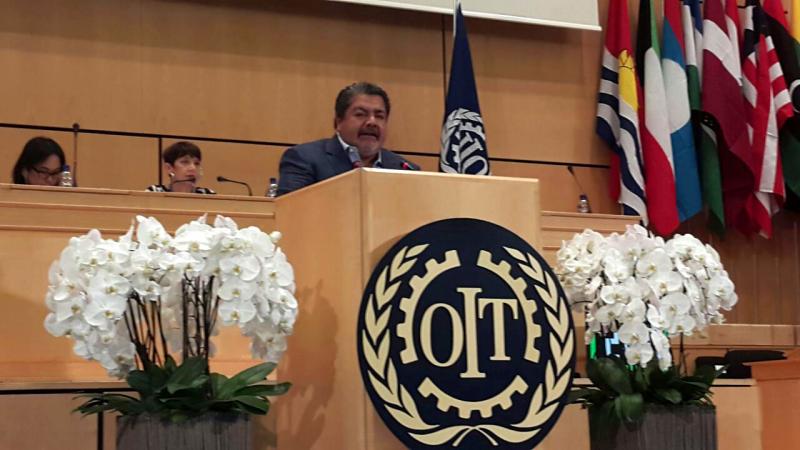
05/06/2015

18/02/2015
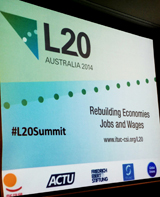
14/11/2014
EXPLANATORY GERARDO MARTINEZ IN THE L -20 - AUSTRALIA TRADE IN BRISBANE G20 under 12 to November 14, 2014
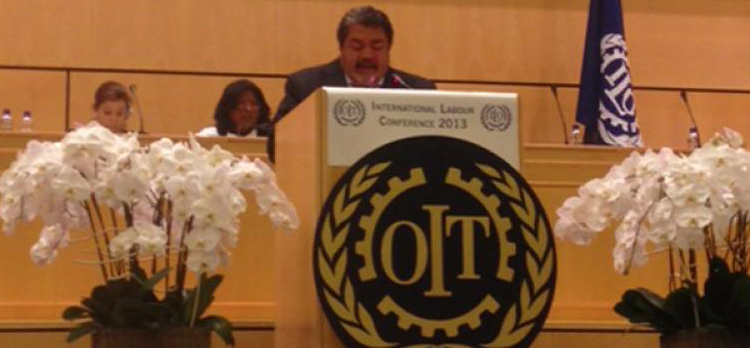
16/10/2014
Gerardo Martinez sets before the 18th Regional Meeting of the International Labour Organization Americas Lima Peru Representative Workers held in Lima from 13 to October 16, 2014
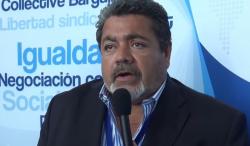
28/06/2014
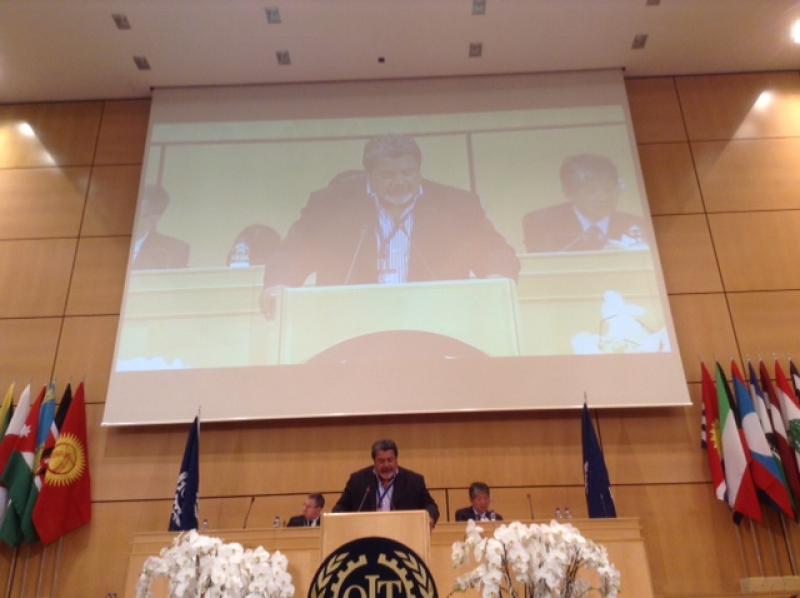
05/06/2014
In his speech Gerardo Martínez endorsed the need for " a paradigm shift because workers need a working society and the productive economy , labor citizenship , where work is the engine of growth, inclusion and equality "
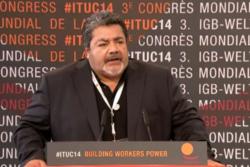
23/05/2014
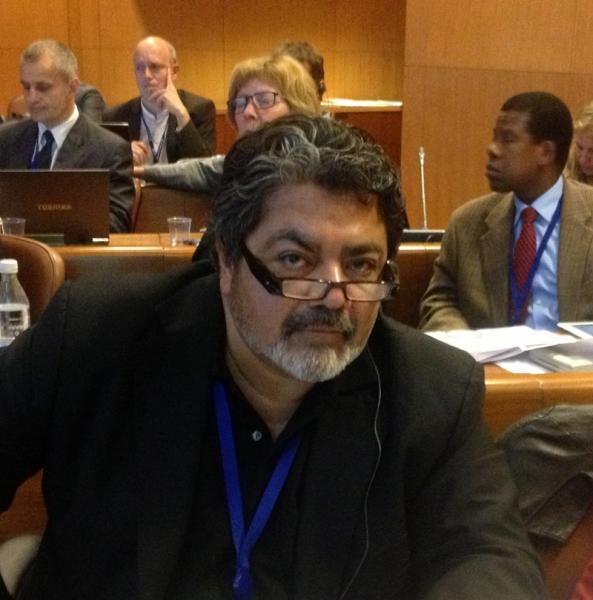
20/06/2013
Gerardo Martinez, President of the Workers' group of the Commission on Sustainable Development, Decent Work and Green Jobs , presented at the 102nd Assembly of the International Labour Conference of the ILO, which adopted the report by acclamation.
Gerardo Martínez said " The productive development and growth must consider the needs of protecting the environment and sustainable and , in turn , it has to improve the social and working conditions ", " This change must generate a fair transition and this , should provide decent work and the rights of workers "

14/06/2013
SR. PRESIDENTE:
LA MEMORIA DEL DIRECTOR GENERAL, ES UNA RESPUESTA POLITICA A LA REALIDAD MUNDIAL QUE REAFIRMA LA IMPORTANCIA DE LOS CONSENSOS, ARTICULADOS DESDE UN DIALOGO SOCIAL SINCERO Y PROACTIVO, DONDE SE JERARQUIZA A LOS TRABAJADORES COMO INTERLOCUTORES POLITICOS.
HOY LA CRISIS SE AGRAVA, LA DESIGUALDAD EN EL MUNDO AUMENTA POR LA PRECARIZACIÕN PERMANENTE DE LAS CONDICIONES DE TRABAJO.
EN EL NUEVO ESCENARIO INTERNACIONAL LOS VALORES DEL TRABAJO Y LA PRODUCCIÕN ESTáN ALTERADOS.
CUANDO EL CAPITAL FINANCIERO MANDA, SIEMPRE SE AJUSTA PERJUDICANDO A LOS TRABAJADORES Y PROFUNDIZANDO LAS DESIGUALDADES.
COMO DICE EL PAPA FRANCISCO, LA HUMANIDAD HA ENCONTRADO UNA NUEVA Y DESPIADADA IMAGEN EN EL DINERO Y EN LA DICTADURA DE UNA ECONOMIA SIN ROSTRO
ANTE EL ACTUAL MODELO DE MONETARISMO QUE DEJA DE LADO LOS PILARES SOCIALES, LABORALES Y MEDIOAMBIENTALES �� EXISTE OTRA OPCION.
FRENTE A ESTE ESCENARIO, LA PROPUESTA DEL DIRECTOR DE TRANSFORMAR LA OIT CONSOLIDANDO SU ROL DE GARANTE DE LOS DERECHOS FUNDAMENTALES Y DE LA JUSTICIA SOCIAL, COBRA AUN MAS VIGENCIA Y MARCA UN CAMBIO.
EN LA PROXIMA CUMBRE DEL G 20, LA OIT REQUERIRA A LOS GOBIERNOS QUE CUMPLAN SU PROMESA DE COMBATIR LA CRISIS CON MAS INVERSION EN INFRAESTRUCTURA, FACILITANDO EL ACCESO AL CREDITO PARA LAS PEQUEñAS Y MEDIANAS EMPRESAS, Y ESPECIALMENTE EXTENDIENDO LA COBERTURA DE PROTECCION SOCIAL Y CREANDO EMPLEO PARA LOS JOVENES
ES NECESARIO QUE LOS GOBIERNOS DEN PRIORIDAD A LOS VALORES DE LA POLĨTICA Y Al DESARROLLO SUSTENTABLE CON INCLUSIÕN SOCIAL, POR ENCIMA DE LAS RECETAS ECONOMICISTAS, QUE UTILIZAN A LOS TRABAJADORES COMO VARIABLE DE AJUSTE.
SE DEBEN REFORMULAR LOS ORGANISMOS FINANCIEROS INTERNACIONALES!
HOY LOS PUEBLOS REACCIONAN FRENTE A LAS POLITICAS DE AJUSTE PERMANENTE, SALIENDO A LA CALLE A DEFENDER SUS DERECHOS Y CONQUISTAS.
RECORDAMOS EL LEMA DE LA CUMBRE DE LAS AMERICAS CELEBRADA EN ARGENTINA EN 2005 QUE CONVOCABA A CREAR TRABAJO PARA ENFRENTAR LA POBREZA Y FORTALECER LA GOBERNABILIDAD DEMOCRATICA.
MUCHOS DE ESTOS OBJETIVOS ESTAN PENDIENTES :
SI BIEN SE SIGUEN CONSOLIDANDO LOS SISTEMAS DEMOCRATICOS Y SE REGISTRAN TASAS SIGNIFICATIVAS DE CRECIMIENTO ECONOMICO, LOS INDICADORES DE POBREZA Y DESIGUALDAD NO DICEN LO MISMO.
ESTO ES PORQUE NO HAY DIALOGO SOCIAL REAL Y EN LA MAYORIA DE LOS PAISES NO HAY NEGOCIACION COLECTIVA , POR LO CUAL LA DISTRIBUCION DE LA RIQUEZA FIGURA SOLO EN LOS DISCURSOS.
ESTA SITUACION SE AGRAVA POR LA FALTA DE LIBERTAD SINDICAL, EL DESEMPLEO, LA PRECARIZACION DE LAS CONDICIONES DE TRABAJO, CON INCUMPLIMIENTOS EN SALUD Y SEGURIDAD LABORAL ; Y VIOLENCIA ANTISINDICAL QUE INCLUYE PERSECUCION Y MUERTE.
LOS SINDICATOS ESTAMOS COMPROMETIDOS A DESEMPEñAR UN PAPEL CLAVE PARA PONER FIN A ESTA INJUSTICIA, CON LA MOVILIZACION DE LAS TRABAJADORAS Y TRABAJADORES EN DEFENSA DE NUESTROS DERECHOS.
EN ARGENTINA, DESDE HACE UNA DECADA LA GENERACION DE EMPLEO Y LOS TRABAJADORES SON EL CENTRO DE LAS POLITICAS PUBLICAS EN EL MARCO DE UN MODELO DE DESARROLLO ECONOMICO Y PRODUCTIVO.
SE HA PROVOCADO UNA TRANSFORMACION EN LAS CONDICIONES SOCIOLABORALES DE NUESTRO PUEBLO, RECONSTRUYENDO EL TEJIDO SOCIAL Y PRODUCTIVO QUE HABIAMOS PERDIDO.
LAS MEDIDAS PARA FAVORECER EL CRECIMIENTO DEL EMPLEO, EL TRABAJO DIGMO Y UNA JUSTA DISTRIBUCION DE LA RIQUEZA HAN SIDO TEMAS CENTRALES EN LA AGENDA DEL GOBIERNO.
� LA PLENA VIGENCIA DE LA NEGOCIACION COLECTIVA,
� EL FORTALECIMIENTO DEL SALARIO MINIMO,
� EL ACCESO PLENO AL BENEFICIO JUBILATORIO,
� LA ASIGNACION UNIVERSAL PARA HIJOS Y PARA MUJERES
EMBARAZADAS; EL IMPULSO A LA EDUCACION Y A LA FORMACION PROFESIONAL COMO HERRAMIENTA DE INCLUSION SOCIAL, SON ALGUNAS DE LAS POLITICAS DESARROLLADAS EN ARGENTINA.
NOS QUEDAN GRANDES TEMAS POR RESOLVER: CREAR MAS Y MEJOR EMPLEO, ERRADICAR LA INFORMALIDAD, DESGRAVAR LOS IMPUESTOS AL TRABAJO, ELIMINAR LOS BOLSONES DE POBREZA Y DE MARGINALIDAD QUE AUN TENEMOS.
RATIFICAMOS QUE ES NECESARIO CONVOCAR A UN CONSEJO DE DESARROLLO ECONOMICO Y SOCIAL, TRIPARTITO, PARA DEBATIR Y ARTICULAR LAS POLITICAS DESTINADAS A SALDAR LA DEUDA SOCIAL PENDIENTE.
UN EJEMPLO DE LOS RESULTADOS POSITIVOS DEL DIALOGO SE HA REGISTRADO EN ESTA CONFERENCIA, EN LA COMISION DE \"DESARROLLO SUSTENTABLE, TRABAJO DECENTE Y EMPLEOS VERDES\", DONDE HEMOS LOGRADO QUE EL DESARROLLO SUSTENTABLE SEA TRANSVERSAL EN TODA LA OIT.
LOS TRABAJADORES CONTAMOS CON LA VOLUNTAD, LA DECISION POLITICA, LA ORGANIZACION Y LA FUERZA PARA ESCRIBIR UN NUEVO CAPITULO DE LA HISTORIA, DONDE LOGREMOS UNIVERSALIZAR LA JUSTA DISTRIBUCION DE LA RIQUEZA, LA DIGNIDAD DEL TRABAJO Y LA JUSTICIA SOCIAL, CONVIRTIENDOSE EN UN LEGADO EFECTIVO Y PERMANENTE PARA EL BENEFICIO DE LAS FUTURAS GENERACIONES.
GRACIAS SR. PRESIDENTE.
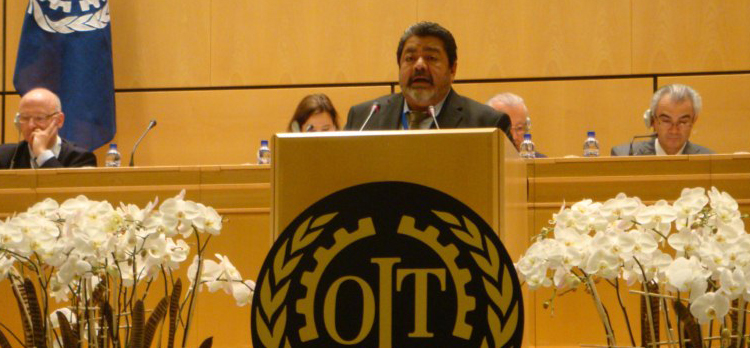
05/06/2013
Gerardo Martinez, member of the Governing Body of the ILO and head of the delegation of workers from Argentina, was appointed Vice President by workers in the Commission of "sustainable development, decent work and green jobs" in the framework of the 102 International Conference ILO work taking place in Geneva from 5 to June 20, 2013.
In the first session of the Commission, composed of governments, employers and workers, Gerardo Martinez, the sole spokesperson of the union sector, he explained the position of workers from the challenges of caring for the environment and the generation of decent work with rights.
In his presentation, Martinez urged tripartite exhaust all efforts necessary to ensure sustainable development and decent work and said: "We must assume that from the current development model, whose key markets and finance, and let aside the social, labor and environmental pillars, there is another option. The multiple crises we face and the global indicators show that we must change. "

14 /06/ 2012
MR. PRESIDENTE:
REPORT OF THE DIRECTOR-GENERAL: IS A POLITICAL RESPONSE TO GLOBAL REALITIES WHICH RESTATES THE IMPORTANCE OF AGREEMENT BASED ON SINCERE AND PROACTIVE SOCIAL DIALOGUE WHERE THE WORKERS ARE CATEGORIZED AS POLITICAL INTERLOCUTORS.
TODAY THE CRISIS IS WORSENING, INEQUALITY IN THE WORLD IS GROWING AS A RESULT OF PRECARIOUS LABOUR CONDITIONS
IN THIS NEW INTERNATIONAL SCENARIO THE VALUES OF WORKING AND PRODUCTION HAVE CHANGED.

05 /06/ 2012
Gerardo Martinez, member of ILO�s Governing Body and head of Argentina workers delegate was appointed as Vice-president by the Committee of Sustainable Development, Decent Work and Green Jobs within the framework of 102nd Session of the International Labour Conference which takes place at Geneva from 5 to 20 June 2013.
In the first session of the Committee, made up of Governments, employers and workers, Gerardo Martinez, as the unique speaker of the trade union sector, explained the position of the workers facing the challenges of environment care and the generation of decent work with rights.
During his speech, Mr. Martinez urged tripartite efforts to guarantee sustainable development and decent work and said ";;We must admit that GIVEN THE CURRENT MODEL OF development which overlooks the social, labour and environmental pillars, there is another alternative. Multiple crises undergone and global indicators show us we must change."
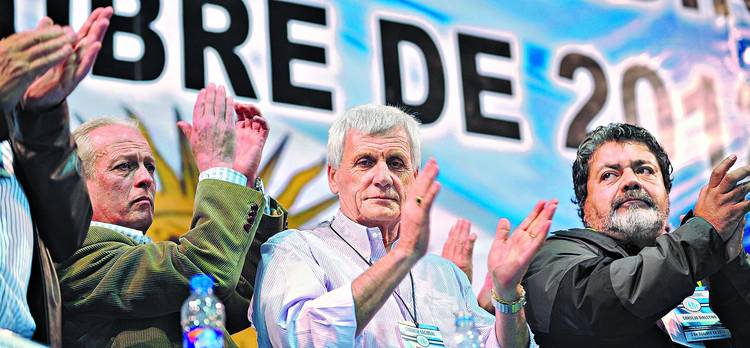
04 /10/ 2012
"The CGT will bring strength to the claims of the sector and represent modern unionism (...) This is the most important event (plant workers) via organic law (...) We are happy that Caló has been elected to lead this CGT, he is an experienced leader devoted to dialogue and the proactive defense of workers (...) We will maintain the links (with Hugo Moyano and Luis Barrionuevo) and continue to talk with them, they are two colleagues who have to join us (...) Unity is achieved by consensus building."
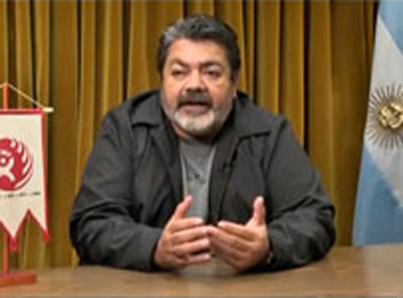
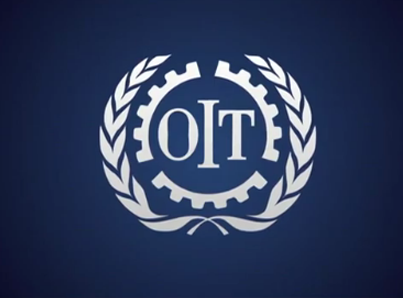
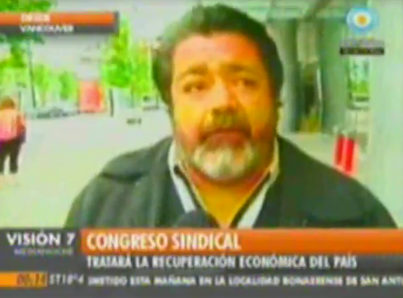

Radio Programme "Cada Mañana" - 29 | August | 2012
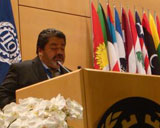
Geneva - 08 | June | 2012
Mr. Gerardo Martinez, Foreign Affairs Secretary of the Republic of Argentina CGT and Member of the ILO�s Governing Body, as Workers Representative from Argentina, spoke at 101st Session of the International Labour Conference to emphasize that it is important that States keep the workers� needs within their political agendas.
Mr. Martinez stated "it is only by resolving unemployment and poverty that we can ensure social peace". He also highlighted that tripartite social dialogue must be recovered since "the tripartite system is a key step towards Social Justice".
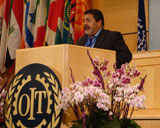
Geneva - 10 | June | 2011
Gerardo Martínez, during his speech at the 100th International Labour Organization ILO Conference highlighted "the time for social justice has come, the time of the workers".
During his speech he referred to "social justice as the main objective of the ILO" and stressed that "there can be no social justice alongside policies designed to reduce salaries and increase labour flexibility".
He expressed he believes that the ILO should be a part of the G20, however he warned that " we need be careful not to ratify positions which only lead to more adjustment and diminished labour rights."
He also praised the social and labour policies of the Argentine Government highlighting "we have ongoing collective bargaining, which goes hand in hand with the increase in activity and employment, the strengthening of the minimum salary and the fight against unregistered labour. We also have Universal Child Allowances and access to pensions".

23 | 06 | 10
Almost 120 years have passed after the first international celebration of May 1.
History demands us a new meaning to this celebration in the time we are living. If in those times workers came together to demand a reduction of the working day to eight hours a day to ensure their work in places where conditions were not unhealthy and would work to prevent children labour, what are the problems that nowadays, the ones who defend the rights of workers, have to take into account?
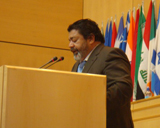
Geneva - 15 | June | 2010
Gerardo Martinez, as Member of the ILO�s Governing Body and Argentine workers representative warned: "Globalization has not brought about the improvement of social conditions" and added "When the financial system fails, however, adjustments are made to the detriment of workers and exacerbate inequality".
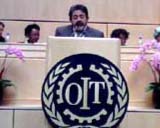
Geneva - 11 | June | 2009
A year ago, most of us were calling for a fairer globalization and for an economic model with social content, in order to bring an end to poverty, marginalization and hunger around the world. Today, we are in a more serious situation. Everything is worse. We are facing the so-called "Tsunami of the financial crisis", which has affected all our national economies. The workers will not pay for this crisis. We shall not be the adjustment variable of this crisis as we have been in the past. We, the workers of Argentina and the region, call for the utopia of a global wage guaranteeing a fair distribution of profits, with decent wages in a fair society with full employment, to be made a reality.

Special Edition 1 | May | 09
Almost 120 years have passed after the first international celebration of May 1. History demands us a new meaning to this celebration in the time we are living. If in those times workers came together to demand a reduction of the working day to eight hours a day to ensure their work in places where conditions were not unhealthy and would work to prevent children labour, what are the problems that nowadays, the ones who defend the rights of workers, have to take into account?
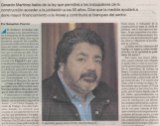
Buenos Aires - 25 | 04 | 09
This week, Argentine Government enacted the Act that will allow building workers� retirement at 55 years old. At the same time, the measure raised employer�s contributions between the 2% and 5%. Presently, 800 building workers retire every year. Gerardo Martinez, Uocra General Secretary, in his interview with Página/12, declared that from now on building workers will have greater retirement perspective that could raise 30% per year. Furthermore, this measure will contribute to providing more financing to the National Administration of Social Services [Anses] and the legalization of the employment status of the building workers.
How did we get to the point in which the law will allow building workers to retire 10 years earlier than other workers?
We started working on this issue together with Sergio Massa � when he was in charge of the Anses- and with Carlos Tomada, Minister of Labour. We have signed an agreement to make progress on the technical aspects of an act that could allow building workers� retirement at 55 years old, something Uocra had been asking for 50 years. This is not a privilege act, but it takes into account the fact that, due to the activities performed, the building worker suffers early ageing.
La normativa establece un aumento de los aportes patronales que van del 2 al 5 por ciento. ¿Cuál fue la reacción del empresariado?
Ellos tienen un discurso muy uniforme y suelen hablar de los aportes patronales como un impuesto al trabajo. El sector privado tiene que comprender que la seguridad social se construye entre todas las partes. Es una ecuación básica, sin empresarios no habría trabajadores, por lo tanto todos tenemos que aportar. Esta ley que se acaba de promulgar, más la tarjeta inteligente que reemplazó la libreta de fondo de desempleo, eleva el estatus del trabajador.
This regulation gives a raise to employers� contributions between the 2% and 5%. What was the reaction of the business sector?
They have a very standardized speech and use to speak about employers� contributions as a working tax. The private sector has to understand that social security is built everywhere. It is a basic equation, if there are not businessmen, there are not workers, and therefore everybody has to contribute. The act that has been already enacted, besides the smart card which came to replace the former Handbook of Unemployment Fund, raise the status of the building workers.
Will this law contribute to the legalization of the employment status of the building workers?
Necessity knows no bounds. Many times businessmen or contractors offer workers unregistered job, and tell them they are going to cash in hand. The building industry represents 5% of total salaries which contributes to the Social Security System (400,000 workers), but it is just the 0.05% of the total retired people (approximately 800 per year). So far, the building worker had no retirement perspectives � due to the hard job they perform- which drove workers to accept unregistered jobs. This Act is a tool for workers have the chance of retirement.
¿Which are the figures of unregistered employment and how will this act influence the number of retired building workers?
In order to achieve greater retirement, we are going to start a publicity campaign in all the union venues to make people aware of the importance of registered employment. We believe the number of retired people will increase gradually, at an average of 30 percent per year. As regards unregistered employment figures, there were times when 47% of workers had an irregular situation, but it decreased to 30% approximately. The number of inspectors in the streets, cross-checking and the publicity campaigns contributed to a culture change about this issue. Furthermore, the legalization of the employment status contributes to fair competition within the same trade, since many companies won the bidding process due to unregistered subcontracting, what is we want to eradicate.
¿How does the global crisis affect the building sector?
The Government adopted different resources and proposals so as to retain investments in the sector through public work and the construction of houses. When we talk to the businessmen, especially around Puerto Madero, Nordelta and Del Libertador Avenue, they say that most of the public work continues, but it is not known if there will be new works in the future.
Interview by Sebastián Premici

Buenos Aires - 29 | July | 2008
Gerardo Martinez�s speech, Foreign Affairs Secretary of the Republic of Argentina CGT and Union Representative in several Forums and International Organizations
I appreciate Daniel Funes invitation and introduction. I also want to thank Honorary Chairman Mr. Julio Werthein and the Council�s authorities for giving me the chance to reflect on the Union Movements� action. I will try to show my viewpoint at this difficult moment for the world and for our country: which are the proposals and actions from trade unions to face the global crisis and those applicable experiences to the Argentine reality.

Geneva- 09 | June | 2008
Within the sectorial crisis that my country is going through, there are people who bank on keeping a concentration model, and, on the other hand the people who have the strong decision, by overwhelming majority, of defending a model of equal wealth distribution containing the most unprotected social sectors. I think a solidarity and fair country demands social dialogue and institutional participation for the debate and design of its policies and strategies. For this reason we propose the creation of an Economic and Social Development Council, to reach consensus in Government policies at long term so as to determine a predictable Argentina with inclusion and development.